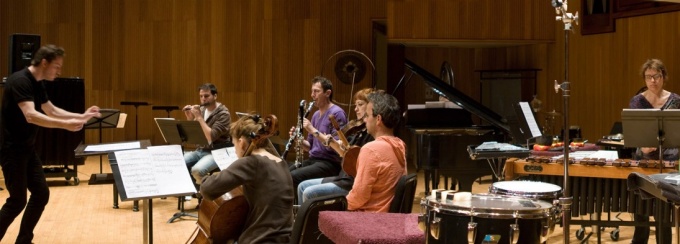PhD in Composition

Conductor Julien Leroy rehearsing Ensemble Court-Circuit members, flutist Jérémie Fèvre, clarinetist Pierre Dutrieu, violinist Alexandra Greffin-Klein, violist David Rose, violoncellist Ingrid Schoenlaub, and percussionist Eve Payeur at the June in Buffalo festival.
Reimagining what music can be
The PhD in Composition at the University at Buffalo’s Department of Music is a rigorous, forward-thinking program for composers who seek to challenge conventions, expand musical boundaries and explore the frontiers of sound, form and expression. With world-class mentorship and a vibrant performance culture, UB prepares the next generation of musical thought leaders.
Jump to:
- Innovation at the Core: Explore bold sound experiments, collaborate across disciplines and push music into new creative spaces.
- Mentorship that Matters: Learn side-by-side with internationally recognized composers and performers who are dedicated to your artistic growth.
- Practice Meets Research: Turn your ideas into reality. Your creative projects are supported by engaging seminars in theory, analysis and aesthetics that sharpen both your artistry and your critical thinking.
- Unmatched Performance Opportunities: Work with world-renowned groups like Talea Ensemble, JACK Quartet, Neue Vocalsolisten Stuttgart, Ensemble Court-Circuit and many more. You’ll also connect with UB’s own Slee Sinfonietta, a group of exceptional performance faculty.
- Next-Gen Technology: Dive into the latest sound processing, recording and audio spatialization tools. Experiment with live electronics, sound installations and collaborations, including hands-on projects with the Experimental Studio in Freiburg, Germany.
At UB, composition is more than technique—it’s about redefining what music can be. The PhD program emphasizes:
- Sound and Instrumental Innovation: Experiment with new technologies, extended techniques and alternative notations.
- Speculative Structures: Develop compositional processes that challenge traditional form and expectation.
- Interdisciplinary Work: Connect your compositions with film, poetry, literature, visual arts and performance, as well as the natural and physical sciences.
- Research and Reflection: Combine hands-on creation with academic rigor through seminars, papers and presentations.
Key features
Coursework: Focused on advanced composition, music analysis, aesthetics and interdisciplinary seminars which center on music and gender, posthumanism, new materialism, music and capitalism, serialism and mathematical applications, and composer/performer collaboration.
Qualifying Exam: Three-part exam covering:
- Contemporary music analysis (based on 10 works)
- Two personalized research areas in consultation with faculty from other disciplines
Qualifying Portfolio: Includes three original compositions and three analytical/research papers developed over the first three years.
Dissertation Components: A substantial original composition accompanied by:
- A public performance or professional recording
- A 10-page reflective paper discussing its aesthetic goals and significance
Teaching and Research Assistantships: Gain hands-on experience in teaching undergraduate composition, theory, musicology or technology courses. Students may also work with faculty on major research initiatives or support events hosted by the Robert and Carol Morris Center for 21st Century Music.
The Department of Music has a rich tradition in experimental and new music, bolstered by:
- The Center for 21st Century Music: Sponsor of the June in Buffalo Festival and other high-profile events, this center fosters international collaborations and groundbreaking performances.
Whether you're composing for orchestra, exploring electronic media or integrating interdisciplinary forms, UB provides the platform to grow, question and create.
Start your journey today:
View PhD Program Metrics
For more information, please reach out to us!
